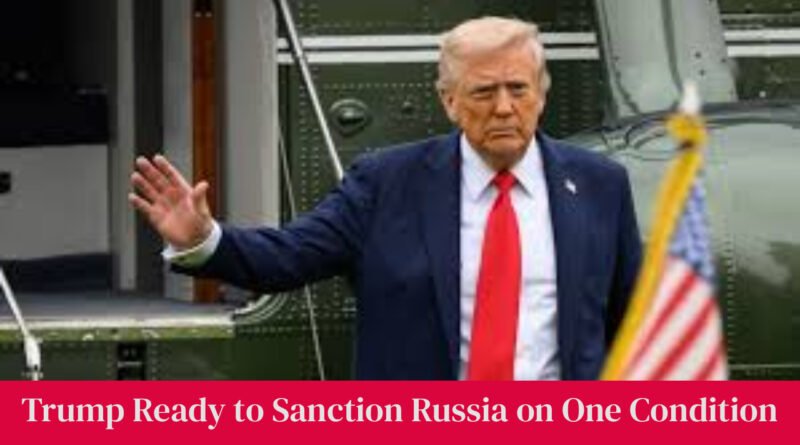Trump Ready to Sanction Russia on One Condition
In a significant statement that underscores the complex economic dimensions of the Ukraine conflict, US President Donald Trump has declared that he is prepared to escalate economic pressure on Moscow, but his commitment is contingent upon a major shift from America’s NATO allies. Taking to his Truth Social platform, the President stated unequivocally that trump ‘ready’ to sanction Russia with more severe measures, but only on the condition that member nations of the NATO alliance collectively agree to and implement a complete halt on their purchases of Russian oil. This declaration positions a unified Western energy embargo as the prerequisite for a new, more aggressive US-led sanctions regime, placing the onus squarely on European capitals to act first.
President Trump’s message, framed as a direct communication to NATO nations, was both a promise and a challenge. “I am ready to ‘go’ when you are. Just say when?” he wrote, characterizing the ongoing flow of European money to Russian energy coffers as “shocking” and a critical weakness that undermines the alliance’s collective bargaining power and moral standing. His proposition outlines a two-pronged strategy: firstly, a complete cessation of Russian energy purchases by NATO members, and secondly, the imposition of heavy tariffs—between 50 to 100%—on China, which he claims would weaken Beijing’s “strong control” over Moscow. He suggested these tariffs could be “fully withdrawn” after the conflict concludes, presenting them as a temporary but powerful tool to strangle the financial lifelines supporting the Russian war machine.
This latest announcement is not the first time President Trump has threatened tougher action, but it adds a specific and public conditionality that marks a strategic shift. Historically, his administration has faced criticism for issuing deadlines and threats that the Kremlin has subsequently ignored without facing the promised repercussions. This new ultimatum comes at a time of heightened geopolitical tension, following a deliberate incursion of Russian drones into Polish airspace—a stark reminder of the direct threat faced by NATO’s eastern flank. In response, allies like Denmark, France, and Germany are already moving military assets eastward to bolster defenses, making Trump’s simultaneous focus on the economic front a crucial part of a broader Western response.
The practical reality of weaning Europe off Russian energy, however, presents a formidable challenge. Since the full-scale invasion began in 2022, the European Union has made staggering progress, reducing its reliance on Russian gas from about 45% to an expected 13% this year—a monumental effort involving billions of euros in investment to secure alternative suppliers. Despite this, President Trump’s statement implies that this progress is insufficient. Furthermore, his message is directed at NATO, not just the EU, thereby including key members like Turkey, which maintains a delicate diplomatic balance and is a major consumer of Russian oil. Persuading Ankara to sever this economic tie would be a diplomatic feat far more complex than unifying EU member states.
The underlying numbers reveal the stakes. According to the Centre for Research on Energy and Clean Air, European nations have spent approximately €210 billion on Russian oil and gas since the war started, a revenue stream that directly funds the invasion President Trump claims he wants to stop. While the EU has committed to a full phase-out by 2028, the US desire is for a much faster timeline. By stating he is trump ‘ready’ to sanction Russia only after NATO acts, President Trump is attempting to accelerate this process dramatically. His strategy links military alliance solidarity with economic policy, suggesting that true collective defense isn’t just about troops and jets, but also about cutting off the enemy’s financial oxygen. Whether this gambit will compel a faster European energy divorce from Moscow remains to be seen, but it undoubtedly raises the pressure on America’s allies to align their economic actions with their strategic rhetoric.
Go To Main Page

